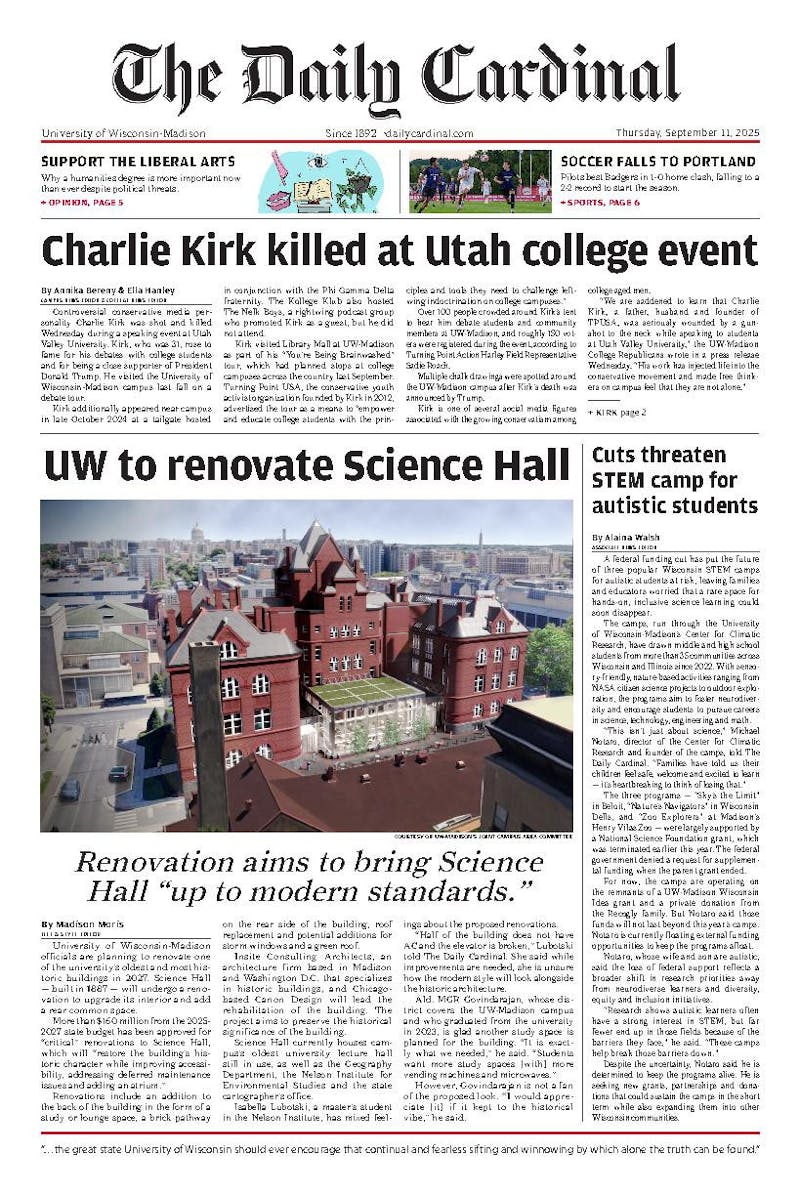In two days, students will be filing into East Campus Mall and taking the elevator up to the Bursar's office to hand over a nice big check to the university. Truthfully, it is a fair trade. The tuition we pay to the university helps fund our education, student organizations and everything from free movies at Memorial Union to SAFECab after a long night. But with tuition increasing every year, and plans for future increases, it is becoming tougher to give away that check.
Chancellor Martin has been busy in her first few years as head of UW-Madison. She created the Go Big Read program, the Madison Initiative for undergraduates and is working on a new business model, all of which cost a lot of money.
The new business model, called the ""Badger Partnership,"" attempts to gain more autonomy from the state and increase need-based aid to students through a tuition increase. Yet, it can be argued that this plan will make school less affordable for many students while allowing the school to continue its high spending.
But Martin claims that by raising tuition to levels closer to other Big Ten schools, the university will be able to offer more financial aid to students.
All students should benefit equally if tuition is raised. Yet, it is doubtful that many will receive any extra financial support. A likely possibility exists that students with lower incomes will fail to receive more aid, while other students will be stuck with higher costs and less money for their own future. Even for students that appear wealthy on paper, tuition is a costly expenditure and that should not increase to help others afford the same education.
In a live-chat about this partnership, Martin explains that the university needs to ""draw on more out-of-state students to help make an education more affordable for Wisconsin residents."" In a Madison Magazine article, she further describes using tuition, presumably from wealthier students, to help fund more financial aid. Like the Madison Initiative for Undergraduates, she asks some students to contribute more in funding to programs that everyone will benefit from.
But raising tuition will make the university less attractive to out-of-state and moderately wealthy students. If UW-Madison has a tuition rate similar to all other Big Ten schools, the university will lose one of its biggest advantages, affordability. There could become a large economic gap in our school's population. While Martin's care for Wisconsin students is noble, her thoughtful gestures will drive away the wallets she hopes to draw from.
To make matters worse, the school wants to gain more autonomy from the state. The university would be able to handle staff compensations and manage facility projects, making the school a more private-public hybrid.
More autonomy would just give the university an easier route to build new facilities and less reason to think about what they are spending, our money. Legislators should be in charge of non-academic projects, such as new facilities. This way if spending gets out of control, people could vote their legislators out of office, something not as easily done with university officials.
Though Martin says that more autonomy in facility projects will lower overhead costs, these overhead costs will be small compared to the cost of new building project after new building project. In an economy as bad as this, the university should be focusing on controlling spending, and less on pet projects. Students and the university can't afford to build forever.
The university should investigate other options to preserve affordability. They need to work with the state instead of trying to separate from it. By working with legislators to increase state funding, which has remained stagnant for the last few years, the university could avoid a massive tuition increase. New facility projects should be re-evaluated for necessity and affordability.
But the debate goes both ways. Students also need to understand that in order to receive the great programs and education; they need to pay for it. A mix of more state funding, spending cuts and modest tuition hikes could be a better answer, rather than a massive tuition increase and less government interaction. Students, the university and government need to work together to keep the university efficient and financially accessible. Instead the ""Badger Partnership"" aims at using the university's power alone to fix the problem.
In the coming weeks and months, Chancellor Martin should come out with specific details of the partnership. What students will qualify for the new aid? How will the university handle projects in an efficient manner? How much will tuition actually increase? These are all questions that need to be answered and discussed with university officials, students and the government.
The ""Badger Partnership"" will change UW-Madison, and only time will tell what will actually arise from it. But one thing is for sure. If this plan is allowed to go through, many students will start to hate that elevator ride up to the Bursar's office even more.
Matt Beaty is a sophomore majoring in math and computer science. Please send all feedback to opinion@dailycardinal.com.






